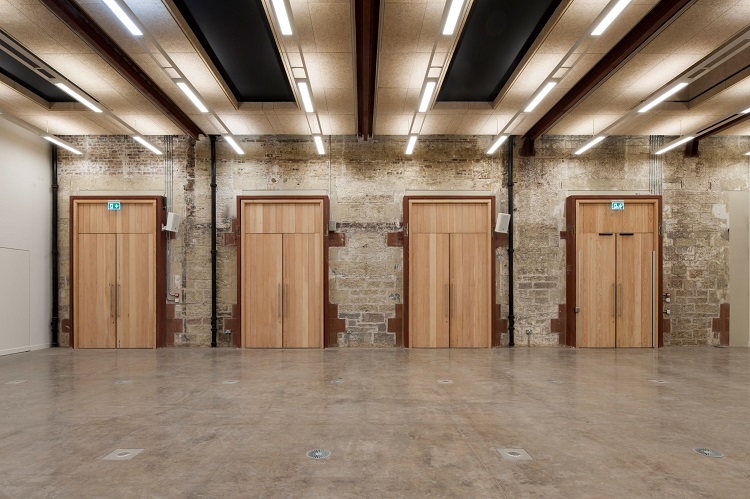Building Briefs – February 26th
- Kier unveils transformation of two University of Edinburgh buildings

ECA copyright Paul Zanre (c)
Kier Construction Scotland has completed the stunning multi-million-pound transformation of two historic buildings within the University of Edinburgh’s campus.
Kier completed the £14m refurbishment of the Grade A Listed Edinburgh College of Art.
Together with performing essential upgrading of the building’s fabric and internal systems, it has carried out a series of improvements, including bringing a previously unused courtyard on the west side of the main building into use.
The West Court is a major new multi-purpose event space, equipped with the very latest in audio and visual facilities.
The second transformation involved the £7.7m refurbishment on of the Grade B-listed building, Murchison House.
Located on the University’s King’s Buildings Campus, the former British Geological Survey building has undergone an extensive fit-out to transform it into a dynamic, multi-functional building. It consists of an open-plan teaching hub with study spaces, lecture theatres, exhibition spaces, Edinburgh Innovations’ offices and incubation units, a café and a range of student services offices.
Brian McQuade, managing director of Kier Construction Scotland and North East, said: “We are proud to have successfully completed these major projects which have allowed us to rejuvenate these historic buildings and provide much improved, state-of-the-art new facilities which will improve the student experience at the University and leave a legacy for staff to enjoy.
“Throughout these projects, we have deepened our relationships with the local supply chain to help create a range of employment opportunities throughout Edinburgh and surrounding areas. We also provided over 50 work placements, paid internships and training opportunities and engaged with over 1,000 school, college and university students to give them a unique insight into these important buildings and into the diverse world of construction.”
- Affordable housing development breaks ground

A new affordable housing development in Doune has been officially launched by Stirling Council’s Housing Portfolio holder, Councillor Evelyn Tweed.
The properties are the latest in a significant programme of new build social rented housing being undertaken by Rural Stirling Housing Association.
The six homes - comprising two semi-detached bungalows and four cottage flats - are being built by Hadden Group and will be available for rent once completed.
Performing the ground-breaking ceremony Cllr Tweed commented: “This is the best part of my job, seeing new housing coming into rural areas, and it is made all the more special as it is my ward and I know just how much this housing is needed in an area like Doune.”
Association Chairperson Margaret Vass welcomed the commencement of works, saying: “These new homes for rent will be a welcome and much-needed addition to the village of Doune and helps us to continue to fulfil our objective of providing quality affordable housing for our rural communities.”
The Balkerach Street development is being undertaken in partnership with NHS Forth Valley which sees a new health centre for the village being constructed adjacent to the new homes.
Steven Brady, managing director of Hadden Group, said: “We’re pleased to have been awarded this housing project from Rural Stirling Housing Association and are looking forward to working in partnership with them to successfully deliver these new affordable homes.”
The properties will be finished with reconstituted stone features, white render exteriors and grey tiled roofs in keeping with nearby buildings.
Donna Birrell, chief executive of RSHA, added: “As well as this providing more rural housing this £1M development completes the last pocket of the masterplan for this side of the village of Doune. It continues to demonstrate our commitment to improving the rural communities in which we operate.
The development, on the site of a former derelict timber yard, is projected for completion in September 2019 with the new tenants moving in shortly afterwards.
- New guide on energy storage launched for UK house builders
Recent advances in household-scale battery systems are making them an ever more attractive option for new home buyers, and there’s an expectation that they could become commonplace as part of a home’s electrical infrastructure in the near future.
A new guide from the NHBC Foundation now aims to ensure that battery systems are selected to be fit for purpose.
The report – NF83 ‘Watts in store? Introduction to energy storage batteries for homes’ – looks at key aspects of battery selection, ensuring that the right questions are asked of manufacturers and that installed systems meet reasonable expectations of home owners.
While inclusion of a battery system is currently a choice, driven either by home buyers who are increasingly aware of the leading brands, or by house builders themselves who see a marketing advantage in offering a battery system, their potential benefits to householders and to the efficiency of national energy supply are significant.
This point has been recognised in other countries, particularly in Germany, where government incentives have stimulated uptake of household batteries and in turn reduced the installed cost dramatically.
Commenting on the new report, NHBC’s Head of Standards, Innovation and Research, Neil Smith said: “Selection is not straightforward as there is now a range of battery types on the market, with considerable variation in performance, and some complexity in the way their performance is described.
“This guide encourages careful specification of performance in line with reasonable homeowner expectations and is a contribution to ensuring successful implementation of battery storage technology.”
The new report is available for free download from www.nhbcfoundation.org
- RSK supports CECA’s call for a more collaborative rail sector
RSK Group, the integrated environmental, engineering and technical services business, has added its support to the Civil Engineering Contactors Association’s (CECA) call on Government to promote a more collaborative rail sector, adding that a failure to adopt such an approach risks the timely delivery of current and ambitious rail investment plans.
RSK also said it welcomes Network Rail’s (NR) own recently announced restructuring plans, which will see a number of previously centralised services and functions devolved to region or route level enabling them to be more responsive to customers and passengers.
Delivering a range of rail infrastructure services by its many subsidiary companies, RSK Group has seen the benefits of collaborative working between operators, network and contractors, such as reduced disruption to rail users, faster works completion times and a reduction in costs.
In support of CECA’s call, and Network Rail’s plans, Adrian Calder RSK Group’s Business Development Director for the rail sector, said: “Some of the most successful rail projects we have been involved are those that have embraced devolved regional or project ownership and abandoned the often-discrete way of working, which sees the objectives of project delivery isolated from track and train.
The work we did with East West Rail Phase 1, Crossrail and on EGIP, demonstrates how collaborative working, which includes early contractor engagement, is not only more logical, but benefits all rail elements including those of the who matter most, the rail user.
Adrian added: “With rail under the spotlight and subject to increasing scrutiny, being able to demonstrate that those constructing and maintaining its infrastructure, are working not only efficiently and in the interests of asset owners but also in the interests of passengers and tax payers, is essential.”
- SDP Scotland gives evidence on procurement practices in construction sector at Scottish Parliament
The Supplier Development Programme (SDP) recently submitted a response to the Scottish Parliament’s Economy, Energy, Jobs and Fair Work Committee’s Consultation on “Construction and Scotland’s Economy.”
The remit of the inquiry was to understand the characteristics and challenges of Scotland’s construction sector to ensure the sector realises its full potential in contributing to a productive and inclusive Scottish economy.
SDP specifically focused on wider procurement issues and how they create challenges within the construction sector.
Today, 26 February 2019, SDP Programme Manager Gillian Cameron gave official evidence to the Committee in the Scottish Parliament.
Gillian Cameron, SDP programme manager, said: “We know that £11 billion is spent annually in the public sector in Scotland, and the Supplier Development Programme provides free training to SMEs to upskill them to be tender ready and bid for pieces of that pie.
“However, there is significant frustration expressed by SMEs to the Supplier Development Programme regarding the complexities in public procurement practices, particularly in the construction sector. SDP has submitted a number of suggestions to the Scottish Parliament in the hope that changes will be made at a strategic level to help struggling Scottish small businesses into working with the public sector and its supply chain.
“We know from the Scottish Government’s construction procurement review (2013) that it’s difficult for SMEs to get on national frameworks and that there’s a lack of construction procurement knowledge of SMEs.
The Supplier Development Programme is a support mechanism for SMEs that could work more effectively with the construction industry to maximise the opportunities for SMEs to compete for public contracts.
“SDP would welcome all construction bodies and Tier 1 Contractors to engage with us and become fully-paid, official Corporate Members of the Supplier Development Programme as an essential first step forward to demonstrate their commitment to best practice in procurement.”

















